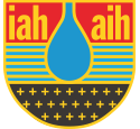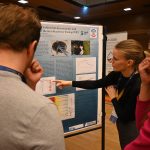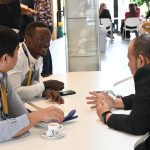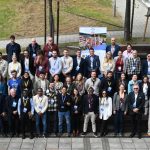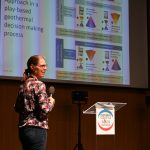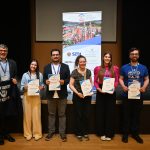In mid-April 2025, the European Geothermal PhD Days were organised by the University of Szeged, focusing on one of the most versatile green energy sources of our time, geothermal energy. The head of the organiseing committee of the event was Dr. János Szanyi, who is also the coordinator of the EFG Geothermal Expert Panel.
The EGPD 2025 event provided an insight into the latest developments in geothermal research in Europe and a unique platform for PhD students, young researchers and professionals at the forefront of research to network and exchange knowledge. The event was attended by 90 participants from 20 countries. Traditionally, the event featured keynote speeches by distinguished researchers such as Ladislaus Rybach, Professor Emeritus of ETH Zurich and former President of the International Geothermal Association (IGA), Miklós Antics, President of the European Geothermal Energy Council (EGEC), Inga Moeck, Professor at the University of Göttingen and Director of the Leibnitz Institute for Applied Geophysics (LIAG) in Hannover, and Tamás Medgyes, Chief Operating Officer of the Szeged District Heating Company.
The EGPD2025 Best Lecturer Award went to Luka Tas from the Ghent University, Belgium; Second place Award: Micheael Erb, Georg August University of Göttingen, Germany; Third place Award: Fiona Chapman, Eau Terre Environment, Quebec Canada – Slovenia; Audience Award: Catarina C. Castro,University of Pécs, Hungary; Hungarain sponsors Award: Hawkar Ali Abdulhaq, University of Szeged, Hungary
The conference took advantage of the location to provide practical experience. The participants visited the district heating company of Szeged, a drilling site where the last well of the 9 Szeged systems is being drilled, and then went to Szentes where they saw good examples of agricultural use of geothermal energy. For a relaxing break, they enjoyed the thermal waters of the Anna Spa in Szeged.
The message of the conference was that as geothermal potential varies from country to country, so does the level of knowledge and expertise. Cooperation between research centres can therefore yield more results than isolated research. A similar conclusion can be drawn for the future of the European Union: only in unity, through coordinated research and innovation, can the geothermal sector play a key role in the energy transition. This strategy must therefore be organised at European level, with cutting-edge research and rapid implementation of innovative solutions.
The event was supported by the National Research, Development and Innovation Office’s Mecenatúra Grant, Hungary and geothermal related organisations, including IAH.
